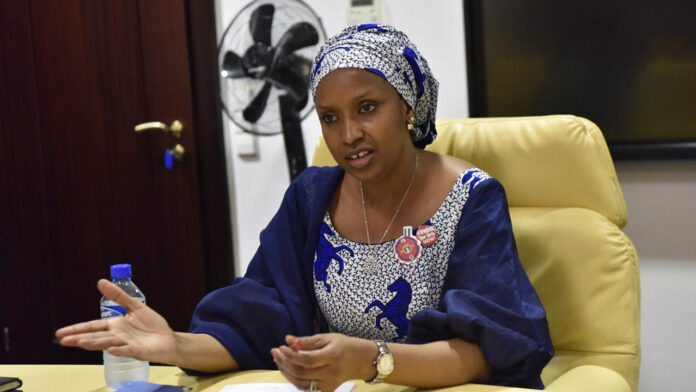The Managing Director of Nigerian Ports Authority (NPA), Ms Hadiza Usman, has said that the African Continental Free Trade Area (AfCFTA) Agreement would help boost intra-Africa trade for Nigerian businesses.
The NPA boss said this at the 12th Africa Nigerian International Maritime Ports and Terminals (NIMPORT) Expo and Conference held in Lagos.
President Muhammadu Buhari, on July 7, 2019 signed the Agreement Establishing the African Continental Free Trade Area (“AfCFTA) in Niamey, Niger Republic, thus making Nigeria the 53rd country to have signed the agreement.
The Agreement seeks to create a single market for goods and services by facilitating free movement of goods, services and investment within the African continent.
Usman said NIMPORT was aimed at creating a multi-sector platform for bridging the divide and connecting all sub sectors in the chain of logistics solutions for manufacturers, shippers and consumers.
The expo had the theme: ”Fostering Africa’s Global Trade Competitiveness and the Role of the Ports”.
Usman was represented at the occasion by NPA’s Assistant General Manager, Mr Durowaiye Ayodele.
According to her, Nigerian ports are undergoing some infrastructural and institutional reforms preparatory to ensuring seamless connectivity.
“Investment in infrastructure will give opportunity to link critical hinterland through rails, waterways and also the rehabilitation of roads leading to ports and a deliberate policy put in place to improving the transport sector.
“All the investment in infrastructure with the signing of the AfCFTA is aimed at integrating the economy of the country and remove barriers,” she said.
Usman pointed that there should also be deliberate policy targeted towards improving the transport sector.
He noted that government needed to address challenges such as dredging of sea ports, corruption, manual processes operations being experienced by the transport sector to enable the country to effectively participate in the regional trade.
Earlier, Mr Fortune Idu, Chairman, NIMPORT, urged African countries to come together and form a trading block for development regional trade in the continent.
He added that the signing of AfCFTA agreement by President Buhari was the much awaited antidote needed to prepare Africa to compete favourably in the global trade as unified body.
According to him, trade between countries has not been seamless and the continent has not been fully integrated in the form of trade and connectivity.
“The next level for regional trade development should come with accelerated port and logistics infrastructure development, trade integration and seamless facilitation and hinterland rail connectivity.
“This next level will present the region as a global trade contender to Europe, China and America and the rest of the world,” he said.
He urged African countries to work hard and create the links through development of coastal water navigational and shipping capacities, regional and pipelines where port cities like Lagos, Port Harcourt, Cotonou, Dualla and others would be connected directly.
Mr Ola Adeeyinwo, Deputy Director, Nigerian Railway Corporation, said that movement of cargos to the hinterland was facing some challenges due to the state of the rail tracks.
According to him, only Apapa port is connected by rail, thus affecting the evacuation of cargos since the rail lines were removed after the concession of the ports.
Mr Williams Akonbi, from the Institute of Oceanography and Marine Research, called for proper research of activities and development on the ocean to be able to maximally benefit from the regional trade arrangements.
According to him, although some of the activities are of economic importance, there is the need to look at the environmental importance.
“The environmental analysis that needs to be done will ensure the reduction of the impact of activities and provide other benefits so that there will not be much loss at the end of the day,” he said.




